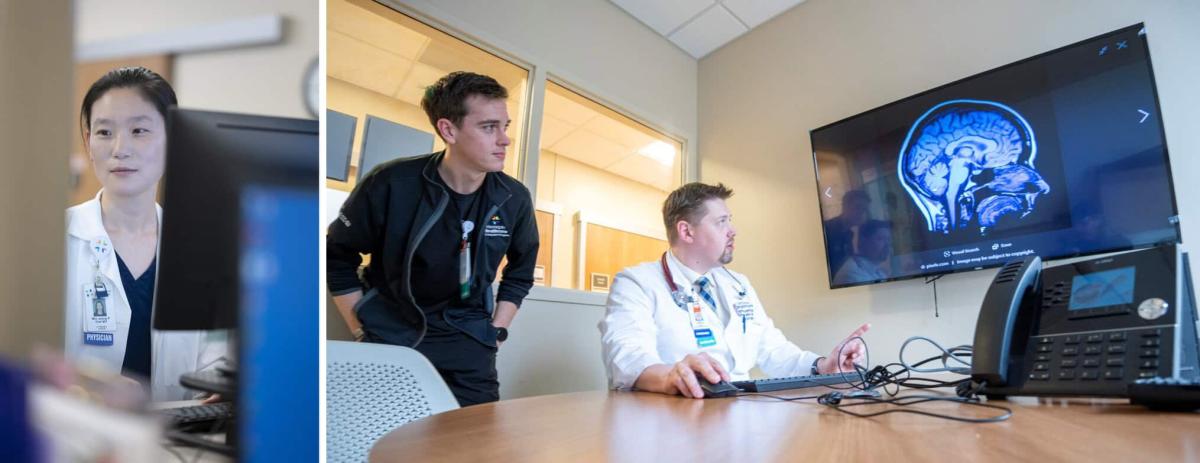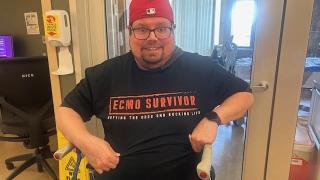
March is "Brain Injury Awareness Month," so we took the opportunity to sit down with four of our TBI Program provider experts, to ask them eight of our most frequently asked patient and family questions about TBI and concussion.
What is the difference between a concussion and a Traumatic Brain Injury (TBI)? Do I have to lose consciousness for it to be a concussion?
Dr. Min Jeong Graf: TBI is a broader term that applies to more than just a concussion. A concussion is often used interchangeably with "mild TBI" especially when there is no bleeding or observable "brain damage" on brain scans. However, a concussion can happen with or without a loss of consciousness. Not remembering the accident or having some confusion after the impact can also indicate a concussion.
What are the most common causes of concussion or mild TBI?
Dr. Min Jeong Graf: Falls are the leading cause of concussion or mild TBI, followed by car accidents, sports-related injuries, or being hit with an object or assault.
What if I have had multiple concussions? Is the recovery after a second concussion usually the same?
Dr. Matthew Puderbaugh: We have a saying in Brain Injury Medicine, "If you've seen one brain injury, you've seen one brain injury." Every brain injury can be a complex picture depending on what areas of the brain were impacted, what the state of the brain was, and how healthy a person was before injury. There does seem to be a compounding effect though, so the more concussions someone has, the more likely that the recovery period will be longer, with an increased chance of having permanent deficits or symptoms.
If my TBI symptoms go away quickly, does that mean I am fully healed?
Dr. Matthew Puderbaugh: The vast majority of concussions do not have persistent symptoms beyond the first few weeks after injury, and once those symptoms resolve, we tend to think that the brain has healed. The brain can still be at risk for a severe injury if re-injured within a few days to weeks after the initial concussion, so we continue to recommend being seen by a medical provider before returning to high-risk activities such as high-impact sports or ladder work, for example.
Can a mild TBI or a concussion have long-term effects?
Carlee Beireis, APRN, CNP: For most people who experience a mild TBI or concussion, there will not be any long-term effects, and they will fully recover. However, some people may notice changes in how they feel or what is normal for them, even after their injury heals. Some people may benefit from extra tools or strategies to support their return to daily activities, like school, work, or social events. Everyone's recovery is different, so it's important to work with healthcare providers to find the best way to feel better and get back to normal life.
My provider said my brain injury is classified as "mild," but I have symptoms that seem much worse than "mild." Should I be worried?
Carlee Beireis, APRN, CNP: It is understandable to feel worried about your symptoms. The important thing to remember is that every brain injury is different. Sometimes, people with mild brain injuries can still have symptoms that feel really strong. Your symptoms may not always match the injury's level of severity.' There's a wide range of how people can feel after a brain injury, even with the same type of injury.
When can I return to sports after a concussion?
Dr. Brionn Tonkin: Returning to sports after a concussion involves a number of steps to ease back into more and more intense physical activity to make sure that your brain has recovered and can handle the increased exertion. The best time to start this is after your symptoms have resolved from your concussion but, after a short period of rest immediately following the injury, some physical activity is generally encouraged for most people, even with mild symptoms.
Do concussions affect children or teens differently from adults?
Dr. Brionn Tonkin: There are certainly differences between adult brains and those of adolescents and children in terms of development, and this can show up in a difference in how these age groups respond to TBI. Although some would argue that adolescents and children may take longer to recover, the best thing to do is to treat each concussion as its own case and individualize the plan of care because every injury is so unique. There may be additional factors to consider in school-aged children versus adults, such as getting them back to school and fully re-integrating into their classes as quickly as possible.



